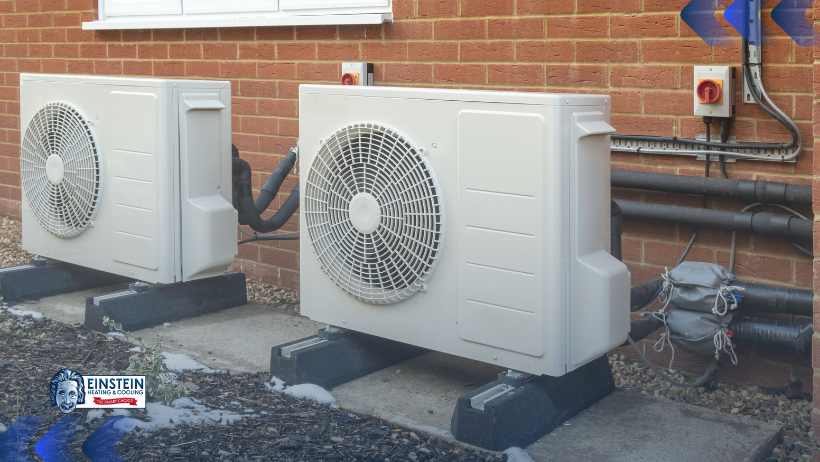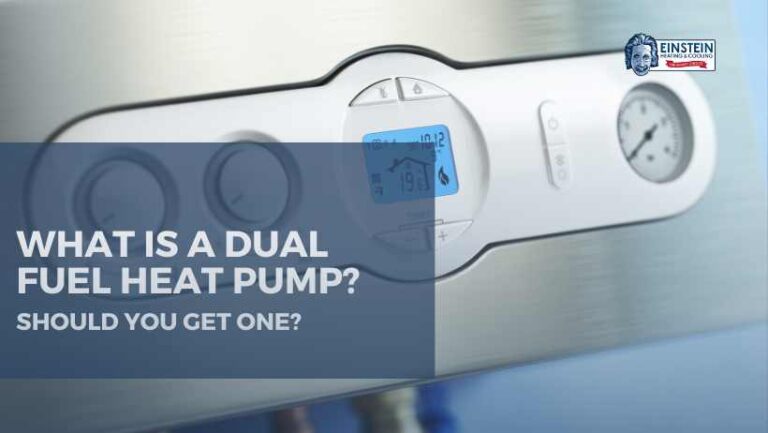The dual-fuel heat pump stands out as a versatile and energy-efficient solution. Combining electric and fossil fuel heating benefits, these systems offer a unique approach to maintaining indoor comfort. In this comprehensive blog post, we will discuss what are dual-fuel heat pumps, exploring the factors that make them a great choice for homeowners.
1. What Is A Dual Fuel Heat Pump?
Understanding the Hybrid Concept
- A dual-fuel heat pump operates by seamlessly switching between electric heat pump and gas furnace modes, depending on external temperatures. When the weather is mild, the system relies on the electric heat pump for energy-efficient heating. However, as temperatures drop, it intelligently switches to the gas furnace, maximizing efficiency and cost-effectiveness.
How Does It Work?
- This sophisticated system typically comprises an electric heat pump, a gas furnace, and a control board that orchestrates the seamless transition between the two modes. The electric heat pump extracts heat from the air, while the gas furnace efficiently kicks in during colder conditions, ensuring optimal performance year-round.
2. Advantages of Dual Fuel Heat Pumps
Energy Efficiency at Its Pinnacle
- Dual fuel heat pumps excel in energy efficiency, leveraging electricity during milder temperatures when heating demands are lower. This not only reduces energy consumption but also results in lower utility bills, making it an eco-friendly and cost-effective solution.
Climate Versatility
Effective in Cold Climates
- One of the standout features of dual-fuel heat pumps is their ability to thrive in cold climates. Unlike traditional heat pumps that may struggle in freezing temperatures, the gas furnace component ensures reliable heating even in the harshest winter conditions.
Adaptability to Temperature Fluctuations
- With the automatic switchover between electric and gas modes, dual-fuel heat pumps seamlessly adapt to temperature fluctuations, providing consistent and comfortable indoor temperatures regardless of external conditions.
Cost Savings Over Time
Lower Operational Costs
- The intelligent operation of dual fuel heating systems allows for lower operational costs. By utilizing electricity when it is more economical and switching to gas during peak demand or extreme cold, these systems provide substantial cost savings over time.
Long-Term Investment
- While the initial cost of installing a dual-fuel heat pump may be slightly higher than traditional systems, the long-term savings in energy bills make it a wise investment. Homeowners and businesses alike can enjoy the benefits of reduced operating expenses in the years to come.
Environmental Friendliness
Reduced Carbon Footprint
- The dual fuel heat pump’s ability to optimize energy sources contributes to a reduced carbon footprint. By relying on electricity when possible and utilizing gas only when necessary, these systems align with eco-friendly practices, making them an attractive choice for environmentally conscious consumers.
Compliance with Energy Standards
- As energy efficiency becomes a focal point globally, dual-fuel heating systems offer a compliant solution. These systems adhere to stringent energy standards, ensuring that users contribute to sustainability efforts without compromising on comfort.
Enhanced Comfort and Control
Consistent Heating Performance
- The seamless transition between electric and gas heating modes ensures consistent and reliable performance, maintaining a comfortable indoor environment for occupants.
Smart Thermostat Integration
- Many dual-fuel heat pump systems are compatible with smart thermostats, allowing users to fine-tune settings remotely. This level of control not only enhances convenience but also enables further energy savings by optimizing heating schedules.
2. Environmental Considerations
- As the world increasingly focuses on sustainable living, the environmental impact of heating and cooling systems has become a critical factor in decision-making. Dual-fuel heat pumps offer a promising solution in this regard.
Reduced Carbon Emissions
- The electric heat pump component of dual fuel systems relies on electricity, which can be sourced from renewable energy. This inherently reduces carbon emissions compared to traditional heating systems that rely solely on fossil fuels. The ability to switch to a cleaner energy source contributes to a lower overall environmental footprint.
Energy Source Flexibility
- Dual-fuel heat pumps provide flexibility in choosing the energy source for heating. Homeowners can opt for a secondary heating system that aligns with their environmental values, such as using biofuels or renewable natural gas. This adaptability allows for a more personalized and eco-friendly approach to home heating.
3. Operational Flexibility
One of the key features that make dual fuel heat pumps stand out is their operational flexibility. This adaptability ensures optimal performance under various conditions, providing homeowners with peace of mind.
Intelligent Temperature Control
- Dual fuel systems come equipped with sophisticated controls that monitor external temperatures and adjust the heating source accordingly. This intelligent temperature control not only enhances comfort but also ensures efficient energy usage, making it an ideal solution for homes with varying climate patterns.
Emergency Heating
- In the event of extreme weather conditions, dual-fuel heating systems can switch to the secondary heating source as a backup. This emergency heating capability ensures that homeowners are never left without a reliable heat source, even during the harshest winter days.
4. Installation and Maintenance
Efficient and hassle-free installation, coupled with straightforward maintenance, adds to the appeal of dual-fuel heat pumps for homeowners seeking convenience.
Seamless Integration
- Installing a dual-fuel heat pump is often a seamless process, especially for homes already equipped with a traditional heating system. The existing ductwork and infrastructure can often be utilized, minimizing the installation time and costs associated with transitioning to a new heating system.
Routine Maintenance
- Maintenance of dual fuel heat pumps is typically straightforward. Regular servicing by expert HVAC technicians ensures optimal performance and longevity. Homeowners can benefit from routine check-ups to identify and address any issues promptly, preventing potential disruptions in heating during critical times.
5. Economic Considerations
Understanding the economic aspects of dual-fuel heat pumps is crucial for homeowners looking to make informed decisions about their heating systems.
Initial Investment
- While dual-fuel heat pumps may have a slightly higher upfront cost compared to traditional systems, the potential long-term savings in energy bills often outweigh the initial investment. Homeowners should consider the payback period and overall cost of ownership when evaluating the economic feasibility of these systems.
Government Incentives
- Many governments offer incentives and rebates for installing energy-efficient heating systems, including dual-fuel heat pumps. Homeowners should explore these opportunities to offset some of the initial costs and enhance the overall economic viability of adopting this technology.

6. Compatibility with Existing Infrastructure
For those considering a transition to dual-fuel heat pumps, assessing the compatibility with existing infrastructure is paramount to a smooth and cost-effective implementation.
Ductwork Compatibility
- Dual fuel heat pumps are often compatible with existing ductwork systems, making them an attractive option for homeowners with conventional heating setups. This compatibility streamlines the installation process by HVAC technicians and minimizes the need for extensive modifications to the home’s heating infrastructure.
Zoning Capabilities
- Zoning capabilities are an added benefit of dual-fuel heat pumps, allowing homeowners to control the temperature of different areas independently. This feature enhances comfort and energy efficiency by directing heating where it is needed most, further optimizing the system’s performance.
7. Potential Challenges For Dual Heat Pump Users
While dual-fuel heat pumps offer numerous benefits, it is essential to acknowledge potential challenges and understand how to address them.
Initial Learning Curve
- For homeowners transitioning from traditional heating systems to dual-fuel heat pumps, there may be a learning curve in understanding how to optimize and control the system effectively. Manufacturers and installers often provide comprehensive guidance and support to help users make the most of their dual-fuel systems.
Fuel Availability
- The availability of secondary heating fuel, whether natural gas or propane, can pose a challenge in certain regions. Homeowners should assess the accessibility and affordability of these fuels in their area before committing to dual-fuel heat pumps. Exploring alternative fuel options can also be considered as a mitigation strategy.
8. Alternatives to Dual Fuel Heat Pumps
Geothermal Heat Pumps
Geothermal heat pumps harness the Earth’s natural heat to provide efficient heating and cooling for residential and commercial buildings. This alternative to dual-fuel heat pumps comes with several advantages:
Energy Efficiency
- Geothermal heat pumps are known for their high energy efficiency. By tapping into the stable temperature of the Earth, these systems can deliver consistent heating performance, regardless of external weather conditions.
Environmental Friendliness
- Geothermal systems produce minimal greenhouse gas emissions, making them an environmentally friendly choice. They use the Earth’s renewable energy, contributing to a cleaner and more sustainable heating solution.
Lower Operating Costs
- While the initial installation cost of a geothermal heat pump may be higher, the lower operating costs over time can offset this expense. The system’s energy efficiency and reduced dependence on external energy sources contribute to long-term savings.
Air-Source Heat Pumps
Air-source heat pumps are another viable alternative to dual-fuel heat pumps, offering efficient heating and cooling for residential properties. Consider the following factors when evaluating air-source heat pumps:
Cost-Effectiveness
- Air-source heat pumps are generally more affordable to install compared to geothermal systems. This makes them an attractive option for homeowners looking for a cost-effective alternative while still enjoying the benefits of a heat pump.
Versatility
- These heat pumps can operate in various climates, making them suitable for regions with milder winters. Advances in technology have improved their efficiency even in colder temperatures, expanding their applicability to a broader range of environments.
Easy Installation
- Air-source heat pumps are relatively easy to install, requiring less complex infrastructure compared to geothermal systems. The simplicity of installation can lead to shorter project timelines and lower installation costs.
Ductless Mini-Split Systems
Ductless mini-split systems or ductless heat pumps provide a flexible and efficient solution for both heating and cooling. Here are key factors to consider when evaluating them as an alternative to dual-fuel heat pumps:
Zoned Heating
- Ductless mini-split systems allow for zoned heating, enabling homeowners to control the temperature in individual rooms or zones. This level of control enhances energy efficiency by only heating the spaces that are in use.
Space-Saving Design
- The absence of ductwork in ductless mini-split systems makes them an excellent choice for homes with limited space. The compact design of indoor units and the flexibility of installation contribute to their popularity in various housing situations.
Energy Efficiency
- Ductless mini-split systems often come with advanced features, such as inverter technology, which optimizes energy consumption. This leads to improved efficiency and lower energy bills, making them a competitive alternative to dual-fuel heat pumps.
Radiant Floor Heating
Radiant floor heating systems deliver heat directly to the floor, providing a comfortable and efficient heating solution. Explore the following factors when considering radiant floor heating as an alternative:
Comfortable Heating
- Radiant floor heating systems distribute heat evenly across the floor, creating a comfortable living environment. This method of heating minimizes temperature fluctuations and eliminates the drafts associated with traditional forced-air systems.
Energy Efficiency
- Radiant floor heating systems can be highly energy-efficient, especially when paired with modern insulation and control systems. They operate at lower temperatures, reducing energy consumption while still maintaining optimal comfort levels.
Low Maintenance
- With fewer moving parts and less wear and tear, radiant floor heating systems generally require lower maintenance compared to other heating alternatives, however, they require expert HVAC technicians as this can be a costly and complicated installation. This can lead to cost savings over the system’s lifespan.
Conclusion
From their ability to adapt to varying climates and contribute to cost savings to their positive impact on the environment, dual heat pumps have positioned themselves as a viable and compelling choice for modern homeowners. As consumers seek efficient, cost-effective, and environmentally friendly options, the dual fuel heat pump stands out as a reliable and innovative choice when installed and maintained properly by professionals at Einstein Heating and Cooling.








